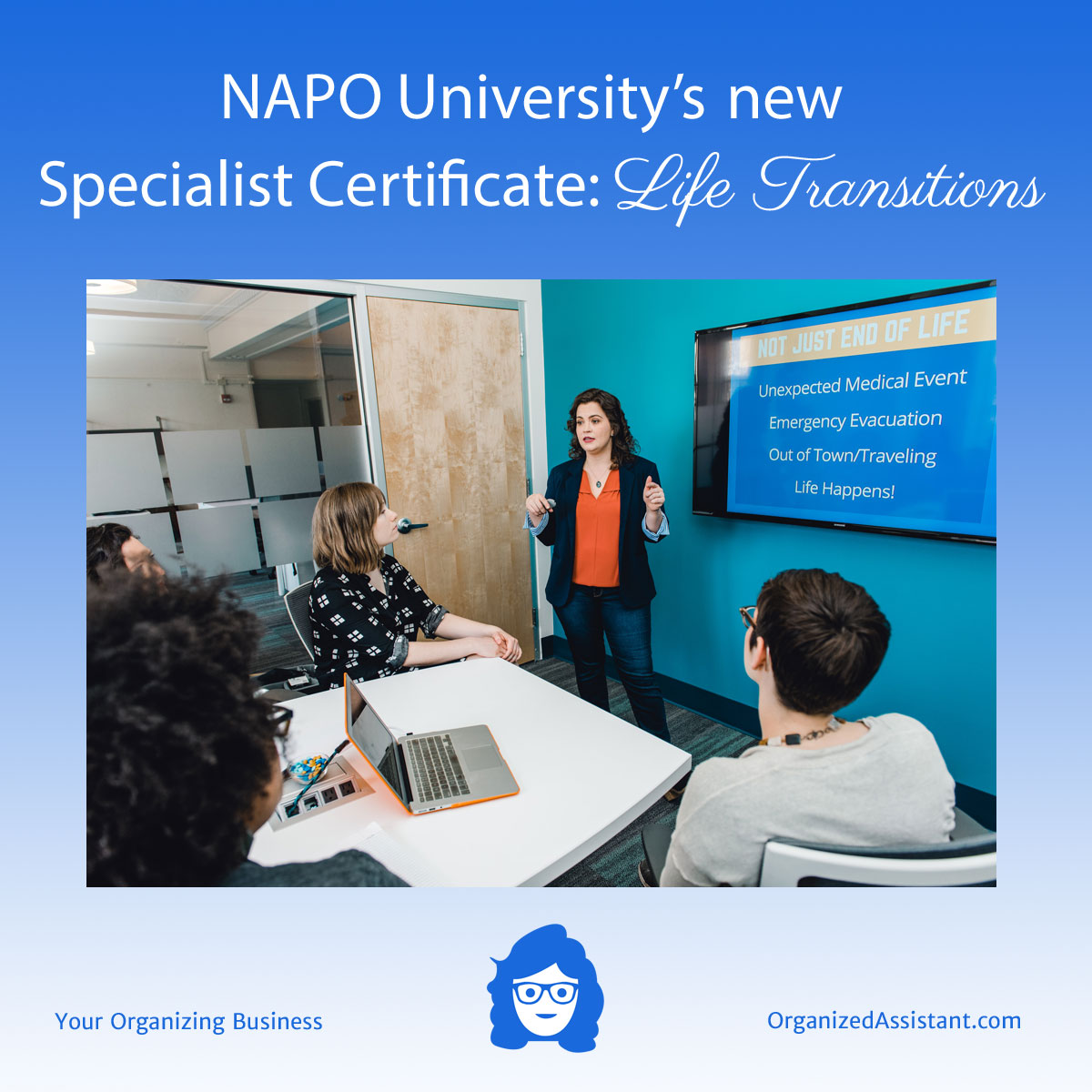Becoming a Certified Professional Organizer
This page may contain links to Amazon.com or other sites from which I may receive commission on purchases you make after clicking on such links. Read my full Disclosure Policy

Anyone can call herself (or himself) a professional organizer, regardless of training or experience, which can make it difficult for consumers to know whether the consultant they contact has the skills to effectively perform the services they require. For this reason, the Board of Certification for Professional Organizers was formed, and the first CPO designations granted in 2007.
Since at that time I was already moving away from organizing to focus on virtual assistance, I have no firsthand knowledge of the certification program, so I’ve asked some of my clients who have earned CPO certification to share their experience.
Reasons for pursuing certification were different for each organizer.
Hellen Buttigieg of We Organize U said:
I had been waiting to certify as a PO for years and was thrilled when I heard it was finally an option. I believe it gives credibility to our industry to have a certification process. I also feel it gives me credibility as a professional organizer.
Shelly Anderson of Come To Order said:
I pursued certification because I was veering off a bit from Organizing towards Coaching and felt that I had skipped a step. Being a PO for 5 years and moving into coaching I felt that I should take a step back and get my CPO before moving any further forward.
Jane Veldhoven of Get Organized by Design said:
My reasons were two-fold for pursuing the BCPO certification. The main reason was because I was expanding my business more into corporate organizing and training and potential clients often asked about my qualifications. The CPO® designation gave me another level of credibility and allowed these clients to feel more confident in my abilities. In addition, I wanted to differentiate myself from other organizers in my market.
Their experience of the certification process varied as well. Jane described it as follows:
It’s a very simple process. You just register on the BCPO website and then they let you know when the next exam date is in your area. I kept track of the number of billable hours in my business, since this is one of the main criteria for eligibility, and I read a lot of the books on the recommended reading list. On the appointed day of the exam, you just show up at a computer testing center in your city, complete the exam on the computer, and they give you your results right away!
The stress of writing an exam and the fact that I had prepared for several months and really wanted to pass was the most difficult part. I believe that waiting until I had been in business for five years made it much easier, as my experience working with clients really came in handy when answering many of the questions.
Hellen’s experience was similar:
The process was virtually painless. I had a lot of the recommended books on my bookcase anyway, so it was a matter of reading them again and making notes to study from.
I live and breathe the topic so I don’t feel it was difficult but I definitely had to think carefully about the answers. If I found myself unsure about the answers to the questions on the exam, I simply reflected back to my experiences with clients and that helped me choose.
Before you run off thinking it’s going to be a walk in the park, be sure to read Shelly’s comments!
I will not kid you, it is a very difficult process. The BCPO provides an outline on requirements and a outline of material included on the test that you need to know/study. I also took the NAPO CPO teleclass; the class was given well but I questioned the material. I wanted the class to be about the material that we needed to know to take the test. In the class they make it very clear that they are not allowed to give direct information that is on the test – just a wide view of professional organizing. I said that I felt that I was in college learning ABC’s.
After the class I decided really quick that I needed to devise my own way to study to be sure of success on the test. I created an index card system – very detailed; and studied for several weeks from these cards. I passed – then I received an audit letter. I spent probably over 20 hours filling out their forms with my information to prove my hours, etc. You cannot just make copies of your calendar – you must fill in their forms. After at least two weeks of working on this I sent in literally a one-inch notebook with copies of all certifications from classes, conference, etc.
Then I received a rejection letter!!!!!!!!!!!!!!!! Oh my gosh, I literally thought that I was going to die right then. All the work – all the money – and rejected. I was rejected on the basis that some of my hours were staging hours – not passing skills organizing. I wrote a letter to my staging clients and asked them to support me by sending a letter to BCPO explaining my process in staging/organizing their homes. My staging is like organizing on steroids. Then I appealed their decision with even more work on a letter explaining why I was appealing. THEN, it was overturned and I was accepted!
Having overcome these challenges, Shelly now says:
I tout the fact that I am a CPO! I am very, very proud of this accomplishment.
Jane echoes these thoughts, saying:
The main impact for me has been my sense of accomplishment and how that translates into a real sense of confidence when I am speaking to prospects and potential clients about my business. I also believe that as a result of this I was able to work with some great clients which had a positive impact on my bottom line.
Visit NAPO.net for more information about BCPO® Certification and to download the BCPO Handbook.
In closing, I’d like to share some advice from Jane Woolsey of An Organized Vision, who is Past President of Professional Organizers in Canada and a nominee for the 2008 Harold Taylor Award who has been nominated again this year:
Attaining your CPO contributes to the overall credibility of the organizing profession. It is not an easy process. The requirements for certification are rigorous and involve a high level of work experience hours as well as textbook knowledge in the various fields of organizing. It is definitely something that every organizer should work towards achieving.
Attaining my CPO designation has certainly allowed me to gain a higher level of respect from my clients and especially in the business world. The other credibility factor is that this is not just a one-time deal, there are ongoing education requirements in order to retain your CPO designation. This is a certification program that deserves respect!
Good luck to all those organizers who choose to pursue their certification and congratulations to those who have achieved it!




I’m one of the developers of the PO405 NAPO class. It is designed as a study group where students can discuss the concepts of organizing so that when they see a question on the exam, they can use an array of knowledge. Shelly is right. The class is designed to fill in the blanks in someone’s education so they could answer any question that was presented, even if not in their specialty area.
I’d love to get my CPO someday but I know that I don’t have enough qualifying hours right now. I think it is very important and I’m working towards it…..like eating an elephant, one bite at a time.
.-= Jacki Hollywood Brown´s last blog ..Tips for the New School Year =-.
Allison, thanks for sharing some details from “the other side!”
Jacki, the requirements are quite stringent, and although I know many excellent organizers who, unfortunately, don’t have enough qualifying hours, I think the fact that certification isn’t easy to achieve makes it that much more valuable. I know of other certifications (not for POs) that are very easy to attain, and as a result the qualifications of some of the people who have “earned” them is rather questionable.
As more people enter the organizing industry, as organizing earns a reputation as necessary and not luxury … consumers’ expectations will grow. For me, the certification was to show that this is a serious career choice, that we do have training, and that we have to live up to professional standards as other professional services firms have. Like in other professional services industries, the certification also ensures that we all continue to improve and grow our skills due to the renewal requirements. Especially as some of us move into organizing/coaching, it’s even more critical that certification demonstrate expertise and experience, certification offered by a respected firm.
Those are all excellent points, Sue.
Certification gives professionals a competitive edge which enables them to ultimately charge more for their services. It then becomes not an expense, but an investment in your future.